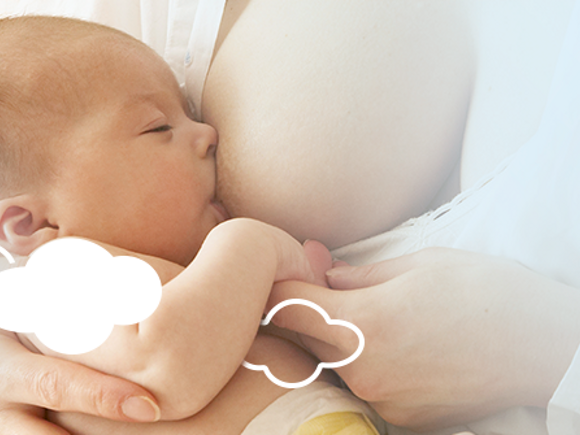By breastfeeding your baby, you are offering them a three-course meal exactly corresponding to the intensive development which takes place in their little body during the first year of life. In effect, breast milk adapts in real time to your baby's development right from birth.
The three stages of breast milk
The composition of your milk changes as the days and weeks pass.
- First few days: after birth, the baby feeds on a thick, yellowy milk that is easy to digest. This is colostrum, which a mother’s body has been producing since the 2nd trimester of pregnancy. Rich in proteins and antibodies, this liquid constitutes the food of choice for the newborn baby. It also helps the baby to pass their first stools (called meconium). It should be given without moderation, as early as possible. Don't worry about the tiny quantity of colostrum produced (can be between 20 and 40 ml per feed): it corresponds precisely to the baby's needs at birth.
- 3rd / 14th day: colostrum gives way to "transitional milk". This is fluid and orangey in colour, lower in proteins than colostrum and higher in lactose (sugar), lipids (fats) and calcium. This corresponds to what is commonly referred to as your milk "coming in", i.e. you start to produce milk in larger quantities. How will you know this is happening? Your breasts will feel hot and hard, and you may even feel a crackling sensation. Note: the more you breastfeed, the more milk you will have.
- At the end of the 2nd week: your milk becomes "mature". It is bluish-white and slightly transparent and contains everything your baby needs to grow: water, proteins, carbohydrates (90% of which is lactose for the development of the brain), lipids (including essential fatty acids), minerals (calcium, iron, phosphorus, etc.) and vitamins from every group. Ensuring you’re eating a well-balanced diet at the time of breastfeeding is extremely important for you and the milk you are producing.
An all-in-one, a well-balanced meal
- Believe it or not, breast milk changes in colour and consistency not only from week to week but also depending on the time of day, and even over the course of a single feed! These changes can be to the lactose levels, lipid (fat) levels, and protein levels. This is one of the reasons why it is important to let your baby feed on demand in terms of frequency and duration, in order to get the full range of nutrients they need in order to grow.
- Your milk also adapts to your baby's changing desires over the course of a feed. At the beginning, the liquid is almost transparent and is particularly rich in water and sugar (lactose) in order to calm your baby's hunger and thirst. As the baby sucks, the milk becomes thicker and richer in lipids and proteins in order to provide the energy they need. By the end of the feed, the level of lipids in the milk has increased in order to satisfy your little one. Thanks to this feeling of fullness, your baby will learn to regulate their appetite. For this reason, it is important to let your baby feed until they let go of the nipple themselves, signalling that it is time to move on to the other breast, or simply end the meal!
Breast milk also adapts to the mother's needs
Have you had twins? If so, don't worry about your body's capacity to breastfeed two children at the same time. You will produce almost double the quantity of milk. If for some reason you are unable to feed with both breasts, the breast you feed with will double its capacity. As long as you maintain a balanced diet, your milk will be ideally suited to your babies' needs.
The only rule is to let your baby take the lead when it comes to breastfeeding. Have faith in both your baby and in yourself.
Breastfeeding is a learned skill, stick with it and you’ll get there !



















